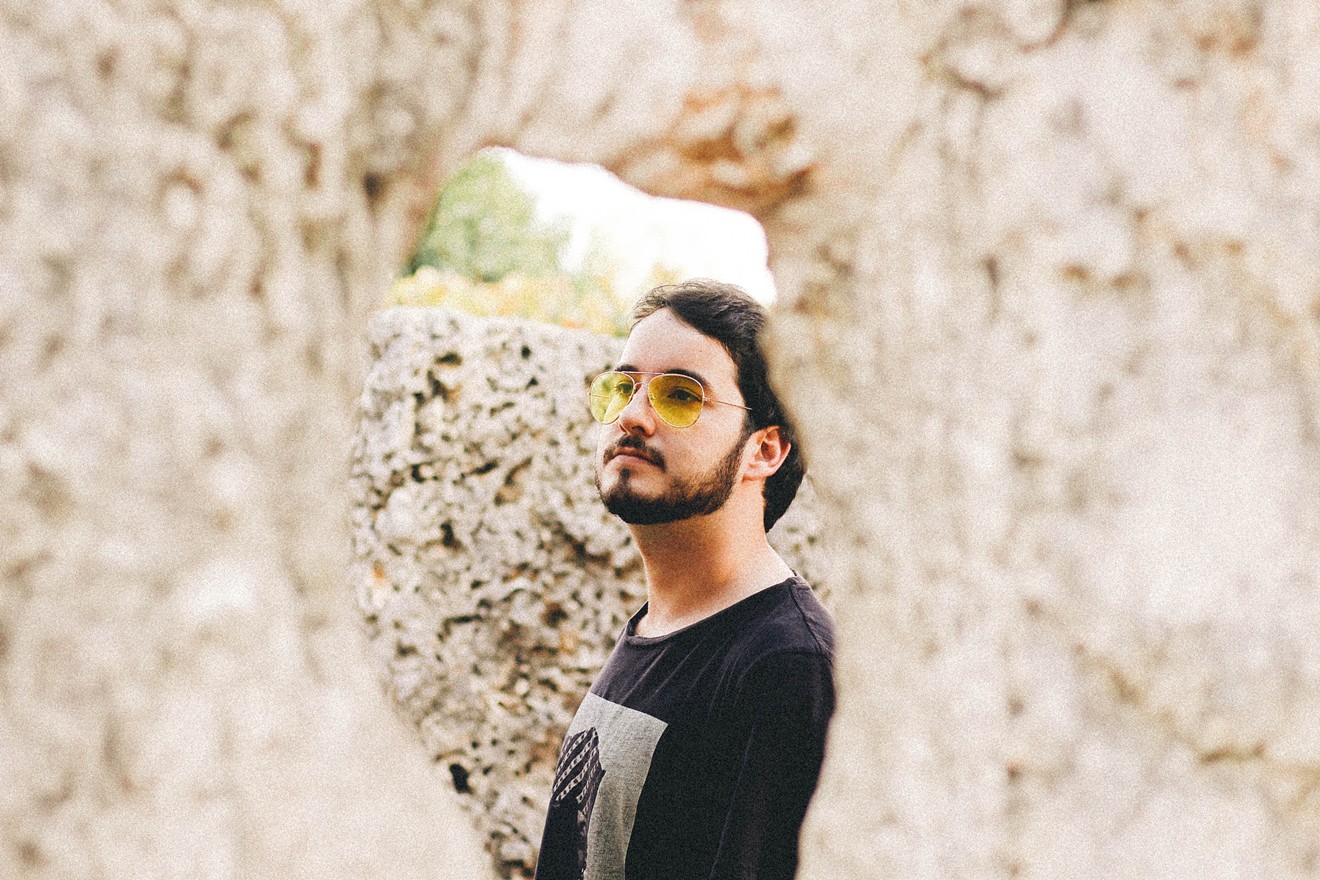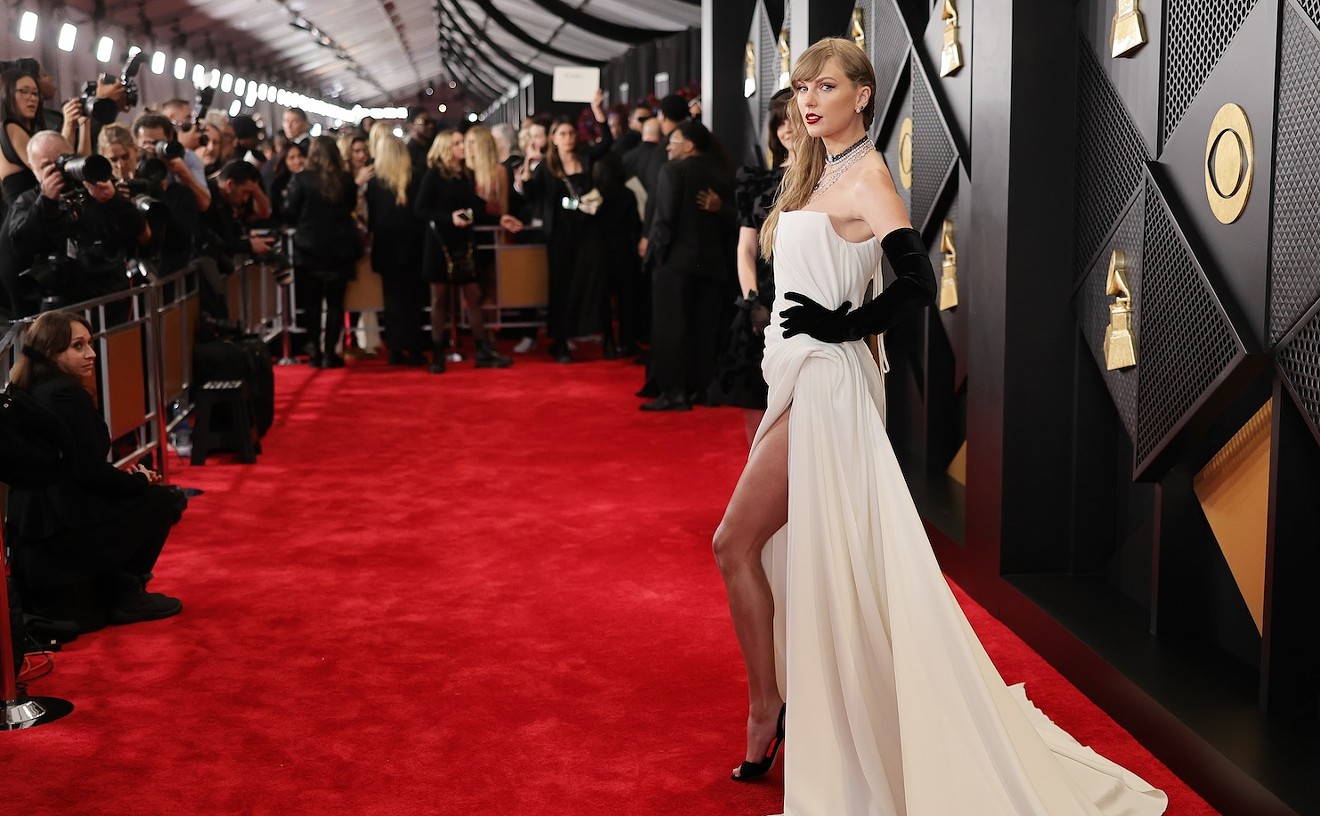“I do not want to work with Daddy Yankee.”
That's a bold declaration from a Latinx producer in Miami. But producer Daniel Mendez is resisting the lucrative allure of reggaeton often presented to his peers. Mendez is adding a new pulse to Miami’s electronic scene under his stage name, Triangles.
Mendez’s choice to identify with the most ubiquitous shape in alternative music is a conscious one. Though groups such as Yacht and Alt-J have made the triangle somewhat of a joke, Mendez seems unbothered, even amused, by its overuse. “It’s a funny story,” Mendez says. “My friend George said, ‘Man, you’re gonna get a triangle tattoo and call yourself Triangles.’” So he did. “If I was in an indie band with the same name, I think I’d get messed up.”
Mendez, 25, was born in Miami but grew up in San Pedro Sula, Honduras, which he describes as “the murder capital of the world.” Nonetheless, he's thankful for the perspective he gained there. Back in Miami, Mendez resolved to help change the narrative of violence often imposed upon Latin America.
“Hell, yeah,” he interjects. “I want to put Honduras on the map. When was the last time you heard something from Honduras that wasn’t reggaeton?” He cites Empress Of, a Honduran dream-pop and R&B act, as an example of Honduran talent outside the ubiquitous genre.
Mendez approached music first as a fan. Growing up, his Colombian father introduced him to disco, soul, and house, and he listened to a lot of rap and R&B in Honduras. He cites “the OGs of beat music,” J Dilla and Mad Lib.
Mendez blends these genres in his instrumental work, a tessellation of countries and genres anyone can vibe to. Miami and its EDM craze of the late '00s provided the backdrop for Triangles’ launch into experimental territory. “It was when that whole EDM wave popped up, remember?” he says. “Everybody wanted to be a DJ, and I thought, This is boring.”
He admits he never thought he’d be a musician in the traditional sense, like his pianist brothers, though he used to play the violin. “Then I started making beats.”
Having just moved back to Miami at 18 years old, an ambitious Mendez found a voice in beat music. He studied audio production at Miami International University of Art & Design after leaving his psychology major at Florida International University, deciding he “didn’t want to just graduate, get a job, and make beats on the side.” He began recording his surroundings to create his own instruments and signature sounds.
“I got into jazz,” he recalls. “I did three or four tapes of jazz, and then I got bored again.”
Mendez often mentions growing bored. Restlessness is the crux of Triangles’ ethos: learning a genre, mastering it, and moving on, all the while weaving it into a fabric of chillwave color. His first album, 2015’s Swimming in Solids, is a geometric arrangement of sounds released initially on cassette — a soundtrack for the kids sitting on the couch after everyone else has found the next party. Miami 2100, released in 2016, pares this vibe down to a concentrated soundscape with electronic and acoustic instrumentation that paints a futurist vision of Miami. This is his project: a confluence of the hard and soft edges of Miami that make the city feel like his Miami Paradise shows. “Ethereal," he describes, "but you can dance to it.”
The album also sees Triangles collaborate with singer Gaby Guerrero of Native Youth, whom Mendez met at the Art Institute. His production on Guerrero’s “Body Talk” made the song a hit, and Mendez’s deep-dive beat elevates the track’s sensuality to another level of slow-burning desire.
Their most recent collaboration, “Running Out of Time,” adds singer Austin Paul (whom Pharrell once called “the future!”) and is grounded in what Mendez calls “future R&B.” The song meditates on a long-distance relationship through lyrics such as, "I've been cautious of all the pain/Yet nauseous/I'm insane/Yeah, I'm running out of time." Mendez explains the mood: “The time you spend with that person is never enough.”
The primacy of vocals on the track foreshadows the distinctly R&B material on Mendez’s next album, Liquid Love (after the Roy Ayers track), due out this fall.
“I’m trying to diversify a bit,” Mendez says again, already in his next musical headspace.
[
{
"name": "Air - MediumRectangle - Inline Content - Mobile Display Size",
"component": "19274298",
"insertPoint": "2",
"requiredCountToDisplay": "2"
},{
"name": "Editor Picks",
"component": "17482312",
"insertPoint": "4",
"requiredCountToDisplay": "1"
},{
"name": "Inline Links",
"component": "18711090",
"insertPoint": "8th",
"startingPoint": 8,
"requiredCountToDisplay": "7",
"maxInsertions": 25
},{
"name": "Air - MediumRectangle - Combo - Inline Content",
"component": "17482310",
"insertPoint": "8th",
"startingPoint": 8,
"requiredCountToDisplay": "7",
"maxInsertions": 25
},{
"name": "Inline Links",
"component": "18711090",
"insertPoint": "8th",
"startingPoint": 12,
"requiredCountToDisplay": "11",
"maxInsertions": 25
},{
"name": "Air - Leaderboard Tower - Combo - Inline Content",
"component": "17482313",
"insertPoint": "8th",
"startingPoint": 12,
"requiredCountToDisplay": "11",
"maxInsertions": 25
}
]











